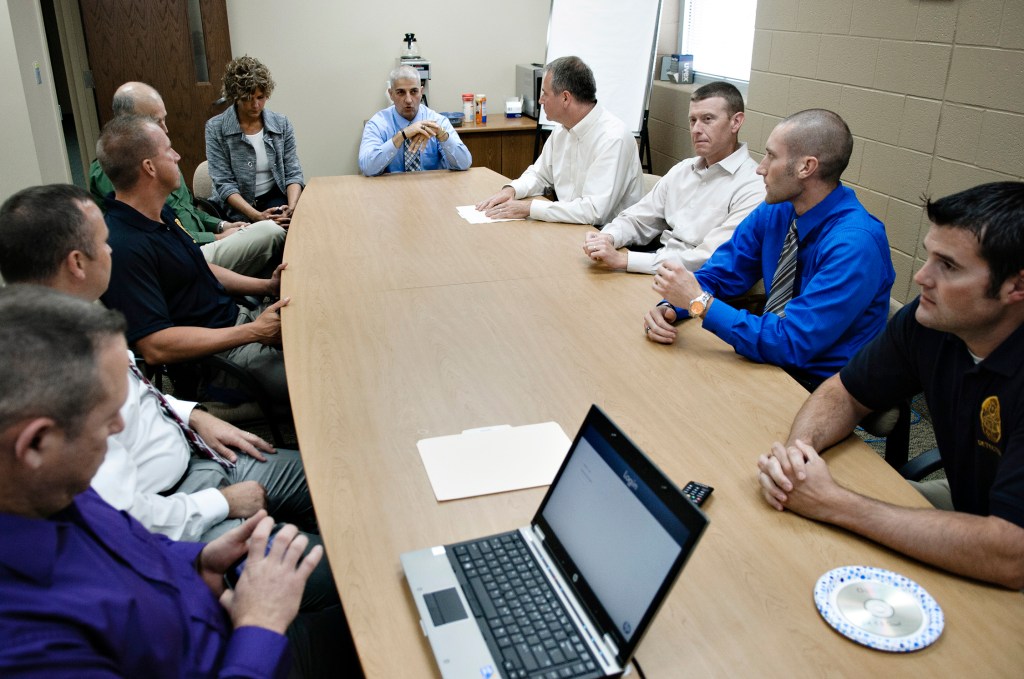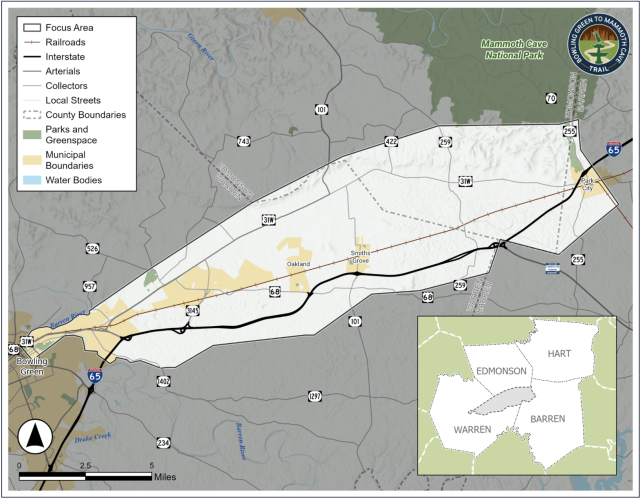Thin blue line: Life experiences, training shape an officer’s career
Published 6:00 am Sunday, July 22, 2012

- Bowling Green Police Department Major L. Clark Arnold (center) talks with detectives and staff in the conference room Monday July 9, 2012 at BGPD headquarters in Bowling Green, Ky. (Photo by Pete Rodman/Daily News)
Bowling Green Police Department Officer David Sterner hops into the black-and-white cruiser.
On the outside it looks like something out of Mayberry.
But on the inside it is pure Star Wars.
Sterner, 43, flips up the laptop computer just below the video camera mounted by a brace on the windshield.
Sterner, like all other Bowling Green police officers, is a product of his past experiences, formal training and street smarts gathered both on the job and off. It’s that combination of life experiences and training that officers here put into use every day serving residents of Bowling Green and other people just passing through town.
Tap, tap, tap.
Quietly Sterner pulls up KYOPS – the Kentucky Open Portal Solution. Only law enforcement can access the password-protected website.
Sterner enters the personal information of James Jones, 1856 Loop Drive, who is nervously sitting in the back seat behind the cage wire.
Jones had walked to the front of BGPD headquarters on Kentucky Street at dusk to turn himself in. Jones figured he would quickly pay a fine at the police station and be done.
Nope.
The electronic paperwork appears on the screen. Two warrants are to be served on Jones, who now will become a guest of the Warren County Regional Jail right across the street. Jones protests that can’t be right.
Sterner has heard that lament before.
Surely there has been a mistake, Jones protests as Sterner quickly pilots the cruiser to the jail sallyport area.
Nope. The screen on KYOPS confirms Jones’ fate.
Sterner had a conversation with a Pennsylvania state trooper years ago who advised him that a stint in the military might a good option if he really wanted to be a cop someday. He once was guarding very large satellite dishes in Colorado for the U.S. Air Force – now he’s making arrangements for a Bowling Green resident to spend some time in jail.
Tap, tap, tap.
Sterner clicks on an electronic map to tell the computer system the location of the offense. That click eventually turns up as an offense in the annual Bowling Green police statistics compiled by the Kentucky State Police.
Tap, tap, tap.
Flipping between an information screen provided by the dispatcher that offers a history of the case, and other screens that offer pull-down menus to fill in the facts, Sterner quickly fills out the report, verifying that the warrants have been signed by judges and that they are active. Two of them, not just the one Jones knew about.
Tap, tap, tap.
Sterner tells the computer to link to the printer in the jail. The paperwork will pop up over there in triplicate and Sterner will, at the halfway point of a night shift, will have done what he learned to do in Atlanta, Afghanistan and now Bowling Green: assess a situation, solve a problem and move on.
Situating Jones is a 45-minute process.
Arriving at the jail, he’s asked to drop off some personal items of an inmate who had to make a quick trip to The Medical Center. Meeting with Officer Drew Bittel at the hospital, the two compare notes.
Bittel’s there because a man kicked in a convenience store door, was arrested, then complained of chest pains while at the jail. The man has been known to seek his 15 minutes of fame from BGPD’s men and women in dark blue.
Bittel will stay with the man at the hospital until he’s returned to the jail.
Sterner knows Bittel’s plight. It could be a long night for the fellow Bowling Green police officer.
Patrol is quiet. Not much up on a Tuesday evening in Bowling Green. A cruise along Fairview Avenue reveals an upscale neighborhood headed to slumber.
Nobody running through the cemetery. A driveway Sterner had on his checklist from the roll call briefing earlier that night is hit with a spotlight.
Nothing going.
The radio crackles.
Two women are fighting at the Speedway on Broadway Avenue. Officer Jarrod Poteet and Cadet Josh Stuart are there first, Sterner minutes later.
It is just after 9 p.m. Could things be heating up?
Pulling up, Sterner can see the fighting is long over. Both women are out of the store – one sitting by the gas pumps and the other Indian-style by the Speedway door.
Sterner first talks to the woman by the gas pump, then confers with Poteet. Then he walks over to the other woman.
No one will be hauled away in handcuffs from the Speedway tonight.
‘Hire for character’
City police officers, just like professionals in other fields, come from all walks of life, each bringing with him or her the same police academy training, but a variety of life experiences that add diversity to the ranks.
Officer Ben Carroll loves the job he does because it is something different every day. Police work wasn’t his first choice. As a teen growing up in Bowling Green, he wanted to be a firefighter.
Capt. Penny Bowles envisioned herself a lawyer. Sgt. Robert Hansen might have been a music teacher.
Chief Doug Hawkins wanted to be a high school shop teacher.
“We are big enough to have the resources to do excellent police work, but small enough that everyone knows everyone else,” Hawkins said. “We can be both professional and personal at the same time.”
BGPD also embraces those individuals who qualify to work for the department. While up to 150 people may apply up to two times a year to obtain one of the six officer slots each half year – a dozen in a year’s time from a possible 300 applicants – Hawkins said he would rather work short as a department than make a bad hire. His mantra is to “hire for character and train for skill.”
“This agency can never do the best job it can do if you don’t have high-quality character people to do it,” Hawkins said. “People we hire understand the value of excellence.”
He also wants those individuals, once hired and trained for work on the street, to feel an acceptance.
“We foster the idea of family – we talk about ourselves externally and internally as family. Over the years you build a culture of family.”
That’s also not common in police circles, according to Sterner.
Sterner, a former officer in the 1,700-member Atlanta Police Department, notices the difference.
“Atlanta does not treat their officers like Bowling Green,” said Sterner, who also served on the Henry County (Ga.) Police Department. “There (in Atlanta) you are a number. You are a body.”
Sterner said Atlanta PD underwent furloughs and pay cuts, and the policies changed rapidly day to day.
“That little stuff takes its toll,” he said. Additionally, Atlanta PD loses about 100 officers a year through the financial issues and the pace.
“You can get burnt out pretty quick there,” Sterner said. “The quality of the officers that they hire here (at BGPD) is different than other places I have experienced. They have a lot of pride. Bowling Green takes crime seriously. It is evident that they want to hold on to innocence of the city.”
Fiscal stewardship benefits PD
City commissioners who are good fiscal stewards have benefited the department, Hawkins said. Budget issues resulting in uncertainty, layoffs and furloughs haven’t hit BGPD like they have in other police departments across the country.
BGPD has an annual budget of $14.4 million, and many of those dollars pay for equipment and training, and – a rarity – a full-time in-house training department.
Police candidates have to pass state-required Peace Officer Professional Standards, or POPS, where candidates are asked to do situps, pushups, bench press weights and run.
“We want to make sure the officer has the physical and tactical skills to survive,” said Hansen, who alternates between serving as a training officer and a night-shift supervisor.
After graduation from the police academy formally known as the Department of Criminal Justice Training at Richmond, a two-week in-house training and 18 weeks of training with veteran officers in the car on live calls, a BGPD officer has another year of evaluation before he or she is no longer in the probationary period of employment.
Later in that career comes refresher training, 40 hours required annually by the state and in-house specialized training. The three major areas of training include firearms, defensive tactics and driving skills, Hansen said.
The minimum requirements to be a BGPD officer are U.S. citizenship. You must be at least 21 years old. You must have a valid driver’s license. You can’t be a convicted felon or convicted of a domestic violence offense, and you must have a high school diploma. Preference is given to people with 60 college credit hours, four years of military service – active or reserve – or if you are a certified officer not currently under contract with another law enforcement agency.
Other factors include a good driving, police, personal and employment record.
The annual starting salary is $35,139, with an increase to $38,239 upon the completion of basic training. Officers also receive a $3,100 annual state incentive supplemental pay, which flows through the city but comes from the state.
Hawkins earns the highest salary at $98,381.30. Deputy Chief John Stewart, who oversees the support services bureau, is paid $79,221.58, while Deputy Chief Gary Rich, who oversees the field operations bureau, is paid $77,700.27.
People to people
At its most basic level, police work is about building relationships.
As Sterner nears the end of his shift on a recent Wednesday morning, the time has come for completing electronic paperwork. Using the various screens provided by the laptop computer, he draws an accident report for a Scottsville Road two-car collision earlier in his shift. Later he will fill out a report on the fight between the two women at the Speedway.
Police work, many times, comes down to the people.
“You should know the clerk at the Minit Mart or the bagger at Kroger, because you never know when you may need to talk to them,” Bowles said. It’s important to build those relationships on a day-to-day basis.
“See them when you don’t need something,” Bowles said. “Listen to them. They could save your life.”
Police work is also pace.
Carroll said when an officer is first starting out a career, there is a tendency to sprint.
“Write as many tickets as you can, and put away as many bad guys as you can. Then, as a five-year officer, you want to pace yourself,” he said.
After setting aside his initial plan to become a firefighter, Carroll plans to stick with police work for the long haul.
“It’s more of a marathon than a sprint,” he said.






